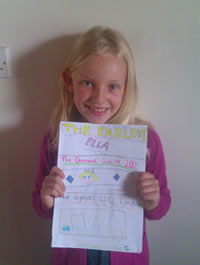
What don’t children like?
If I asked you to list some of the thing that children don’t like you might say: – learning stuff of no immediate or obvious relevance e.g. grammar rules or lists of vocabulary; having to read about topics they have no interest in; being told to ‘be quiet’, to stop talking to their friends; being passive; never being asked for their view or about topics they know about; never seeing an end or a point to the work they have to do; always being told what to do!
Yet, this is exactly the way many classrooms work.
What do children like doing?
One way to get children doing what they like while still learning is through projects. Children enjoy using their imagination – making up characters, stories; being creative – making things, drawing, colouring, cutting and gluing, using multimedia; finding out about interesting stuff; sharing, chatting, working together; talking about themselves, their friends and family, their interests; making choices, deciding for themselves, trying new things out; showing off!
What are Projects?
Experiential learning or ‘learning through projects’ is a tried and tested way of motivating children – by doing what they naturally like doing and avoiding what they don’t like.
It’s an approach founded on sound pedagogic principles. It addresses the needs of the ‘whole child’ to develop a number of different skills
- the intellectual skills
- physical/motor and ICT skills
- social skills
- learner independence skills
Children are given an opportunity to produce work which is personal and individual, which reflects their own ideas and interests, and their opinions are asked for and valued.
It gives the children an opportunity to bring their knowledge of the world into the classroom and can be cross-curricular – linked to other subjects the children are studying in school.
So what’s special about Project Work?
- It integrates language. Target language – grammar and vocabulary, can be planned to fit naturally into the project. The challenge is to identify the target language and language skills you want to practise and incorporate them into something which the children produce. For example: grammar – present tense; vocabulary – family members/ name/age? The children can each make a family tree mobile out of a wire coat hanger and pieces of card tied to the coat hanger by string; a card for each family member on which there are drawings or photos, and examples of target language: This is my sister. Her name is Jessica. She is 8. Each mobile is different but practises the same language.
- Specific outcome or end product. It’s important that the children have something to show at the end of the project, e.g. the family mobile – there are some more ideas below.
- Real – published, public audience, used/ read by others. Try to make the end product as real, personal and ‘special’ as possible so the children feel their project work is valued.
- Planned by teacher but students’ ideas and interests – and students’ work. The teacher plans but the children do! It’s their end product not the teacher’s.
What kind of end products can the children produce?
There are lots of ideas. Here are just a few.
- a wall display e.g. posters or collages. Children all contribute a part to making a whole class end product.
- a report or presentation e.g. on a survey conducted by the children, or research conducted via the Internet.
- an invention e.g. a new form or transport, a futuristic city, a new gadget etc (depending on the target vocabulary)
- a booklet or guide e.g. to their town or to an imaginary place
- a model e.g. of an imaginary island
- a photo story or video e.g. of a story made up by the children, or about a subject researched by them – perhaps ‘leisure opportunities in our town’.
- a magazine or newspaper
- an event e.g. a show/pantomime, a fashion show, a party, an art exhibition –
the possibilities are endless.
Are there any problems with classroom management?
Certainly, project work is more challenging to organise than going through set exercises all together. You have to be organised and plan carefully, especially if children are working on different things – individually or in small groups.
Time has to be allowed to set up activities and to tidy up at the end of the lesson.
You have to think about how and where you are going to store half completed work, and how you are going to display or show off the completed end product.
You have to be tolerant of noise as children talk about and do their work together. In monolingual groups quite a bit may be in L1, which I think is fine so long as the target language is learned and practised through the project work.
It’s hard work but worth it for the enjoyment and sense of achievement!
Here are some ideas for a project on animals: –
The children can (individually or in pairs/groups) do one of more of these activities: choose an animal to research; draw a picture; write a caption; write an article about its habitat, food, etc; create a joint collage; make up a class ‘book’ about the different animals; make a model zoo or wildlife park; do a survey about who has which pets – with a bar chart poster display; write simple poems to make up into (an illustrated) class poetry book.
I’m sure lots of you have done project work – perhaps without realising it! What sort of projects have worked well in your class room? Can you share any ideas for projects?